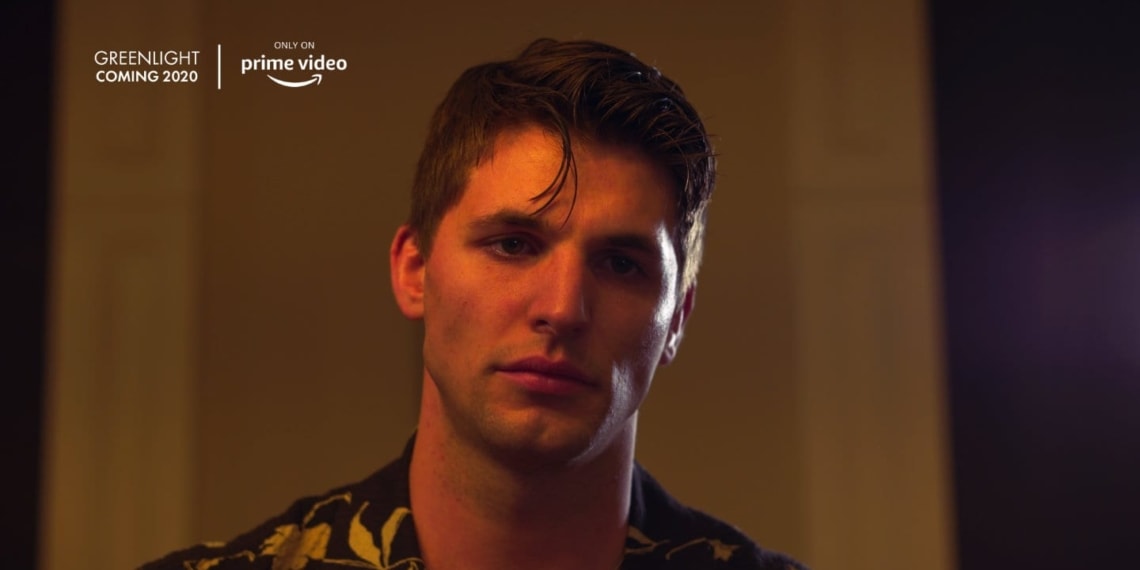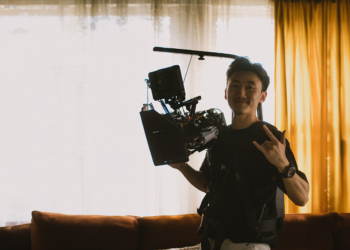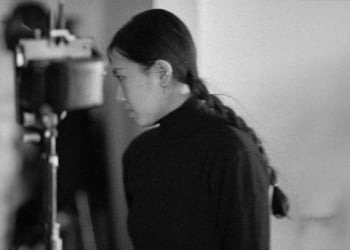Starring Jack Parr and Alexandra Marlin, Gage Oxley’s Greenlight uncovers the dark side of technology. And that, when mixed with the heady cocktail of fame, image-building and felony, makes the loss of privacy its first casual victim. At just 7:58 minutes, the episode offers enough content to warrant multiple viewing.
We have with us its lead actor, Mr Jack Parr, explaining his process, what challenged him the most in playing Sam and why fame can be tricky.
- How did you arrive at the story of Greenlight and came to be associated with the series?
Funny story actually – One day I received an email from a hacker saying that they had my password and could access my computer. They went ahead claiming to have been following and recording my activities. “We’ve seen EVERYTHING. If you don’t send £800 via PayPal we’ll release what you wouldn’t want the world to know about you. And, it will be out there on the social media for ALL of your family to see”; went their message. With this open threat, they sure got me worked up.
I mean, my guess was that it was a scam, at best – but what if it wasn’t? They had my password after all. What if they could really access my computer? This scared me quite a lot, and I shared it with Gage.
I see. So, you decided to put that encounter to good use?
Yes! When I told Gage about it, we decided to put it to good use.
Gage usually disappears after such discussions and returns with a script in a couple of weeks time. The drill is usual for us by now. He anxiously awaits my response and more often than not it’s an emphatic yes from me.
We started working on Greenlight’s script and were so happy with the result that Gage decided to make more of these ‘short films’ which very quickly led to the Amazon Prime Series now available for all to see.
- That’s really interesting. Tell me, since the story came from you, how did it add to your performance?
In my opinion, it’s far easier when you’ve breathed in it from the start. Because, you understand the character, their intentions, objectives better. You understand why they want what they want, because you’ve been on that journey with them. In fact, personally, I prefer to work on things right from the very start.
I see. So that puts having to audition at a disadvantage?
I think so. Because one thing that’s difficult about auditioning for projects is that you only get a couple of sides from your agent and are then told to show up for the audition with absolutely NO idea of who the character is actually or what he’s doing in the film. Which I suppose is the part of the magic, as they might be wanting to see what we can come up with, but it can be a disadvantage too. It helps when one has already gotten into the headspace of the character right from the start, I think.
You can stick to the script and your lines and yet be spontaneous in the way you perform your lines. That’s the art of acting.
- In that case, how important is spontaneity to you in acting? Or do you prefer to remain the director’s clay to mould? Do you prefer rehearsals to letting the magic happen on the set?
A little bit of both actually, but more swaying to the rehearsal and sticking to the script side of things. I do believe in following one’s gut instinct, of course. If something doesn’t feel right, it probably isn’t. But, if it does, sure, why not! But going way off script in the pursuit of improvisation is not my cup of tea. Mainly because it’s a nightmare to edit. If the actors stick to the script and what they’ve rehearsed, then the edit should (in theory) be a smooth road. If the whole shoot consists only of improvisations, I’m guessing the editor has a nightmare of a job at hand.
I write, so I am aware of the effort and research that goes into a script. One then gets into rehearsing and fleshing it all out to see what works and doesn’t and then finally one is set to perform. I agree if something feels right at the moment and it’s bloody amazing – DO IT! But, apart from that, please stick to the darn script.
Having said that, you can stick to the script and your lines and yet be spontaneous in the way you perform your lines. That’s the art of acting. To perform your lines in the most interesting, exciting and engaging way possible.
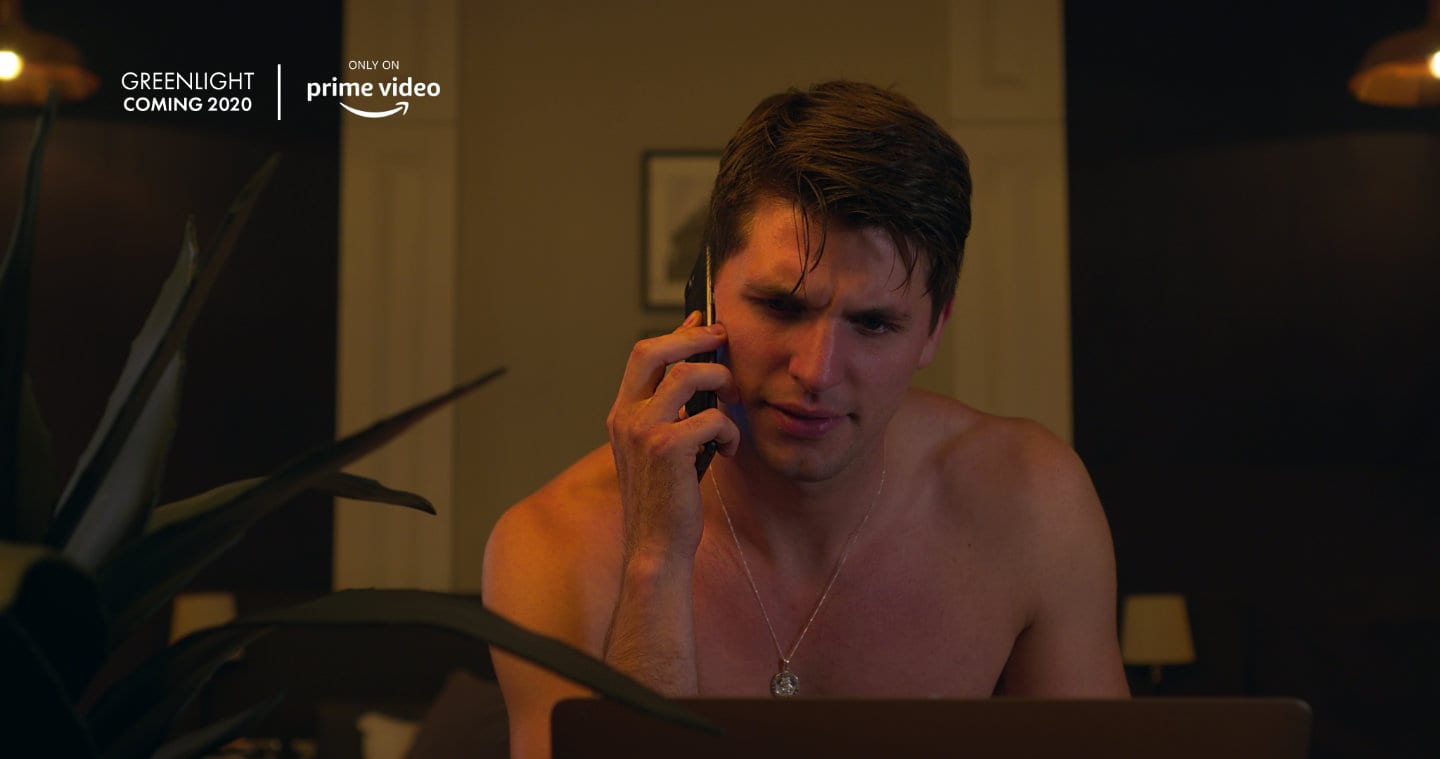
- Co-stars are often credited with the success of a scene. In Greenlight, although you have only one (Chloe played by Alexandra Marlin), her presence is limited to the phone’s screen. What have you learnt from filming for such scenes?
The BIG difference in acting with a pre-recorded set-up, like in the case with Greenlight, where the actor’s role is limited to the phone is that there’s no chemistry. You have to adapt and work along to how the co-actor has already worked on the pre-record. Let me explain, for instance, when I’m rehearsing, I could have wanted a bigger gap between her line and mine, but maybe the pre-record didn’t allow that so I had to rush a few lines to allow her to speak again, otherwise, we would have had an overlapped filming of the scene.
It’s just about adapting. A lot of directors ask you to do a scene in a TOTALLY different way to how you practised, just to see if you can adapt. I’ve been asked to do a shockingly evil scene with the intention of flirting, just to see what happens.
So, when you step on the set, you have to be up for the adaptability, the flexibility that your performance demands. If you’re stubborn and want it done only your way, it can pretty much ruin the system. But, yes, filming such scenes do come with its own constraints, as was the case in Greenlight. But, your own adaptability and understanding of the craft can add volumes to the filming experience.
I sure wouldn’t turn down a role simply because I am required to do something as the character that I don’t personally agree or identify with – I mean isn’t that precisely the role of an actor? To play someone else? To become someone else?
- The character you play in Greenlight is less than idealistic, as are most humans. How important or unimportant is it to you to like the characters you play? Or even to identify with them?
I’m very good at keeping personal opinions away from my characters. I’ve known actors to turn down leading roles because they had to kiss the same sex or film for something that the character does that they don’t personally agree with and hence walk out on the project, despite it being at the near end of its filming. And, these movies have later turned out to be quite good. Imagine what a loss it would have made to both, the art and the artist?
So, if you don’t learn to be objective and keep your personal opinions separate from your work, you might end up not having any work at all. How can you build a career with loving EVERY single motivation and decision your character makes? I don’t think that would be possible. BUT having said that, I do enjoy connecting with the characters, of course. I love playing the characters I like but I sure wouldn’t turn down a role simply because I am required to do something as the character that I don’t personally agree or identify with – I mean isn’t that precisely the role of an actor? To play someone else? To become someone else
- What did you count on, to get under Sam’s skin? He is a glamourous and composed character and yet his breakdown is as unexpected as it is moving in the climax. The build-up to it was great too! How did you make that transition so smoothly?
I find it quite hard to crack like that convincingly, to be honest. During the filming of Greenlight’s climax, I didn’t think I was getting it there or doing it justice, and watching it later didn’t make me feel satisfied with my performance either. Maybe that’s self-criticism creeping in.
But when people seem to believe in something, I would say if you can’t find it within you, soldier on regardless and give your 100%. Because, one can’t sit all day around waiting for an actor to find a certain emotion. So, sometimes you just have to crack on and get done with it. Although a lot of that sort of work is done in the prep. You discover what makes you or the character tick. You uncover a lot in the rehearsals or in your own prep time, actually. And, sometimes, what you practised in the prep doesn’t translate to the set, so you have to quickly think of another tactic to get going. And, sometimes nothing works in the prep, and then when the cameras start rolling, you effortlessly step into the shoes of your character and surprise yourself. You just get the pulse and the emotion gets flying all through your body.
I’m guessing some of the top actors can switch on and off between takes. They must have really learnt how to use their bodies and emotions. I’m not quite there yet. Sometimes it happens and sometimes it doesn’t.
For Greenlight’s last scene, however, I really did feel it. Just staring into space, as the alarm goes off, I know Sam’s whole life ahead of him is going to be a nightmare, years of hard work turned to dust, and this is the very moment it will be all coming down crashing. And, as a single tear rolled down my face during the filming; I cheekily said to myself – “You got it Jacky Boy, keep staring into space” and then I heard ‘‘cut’’.
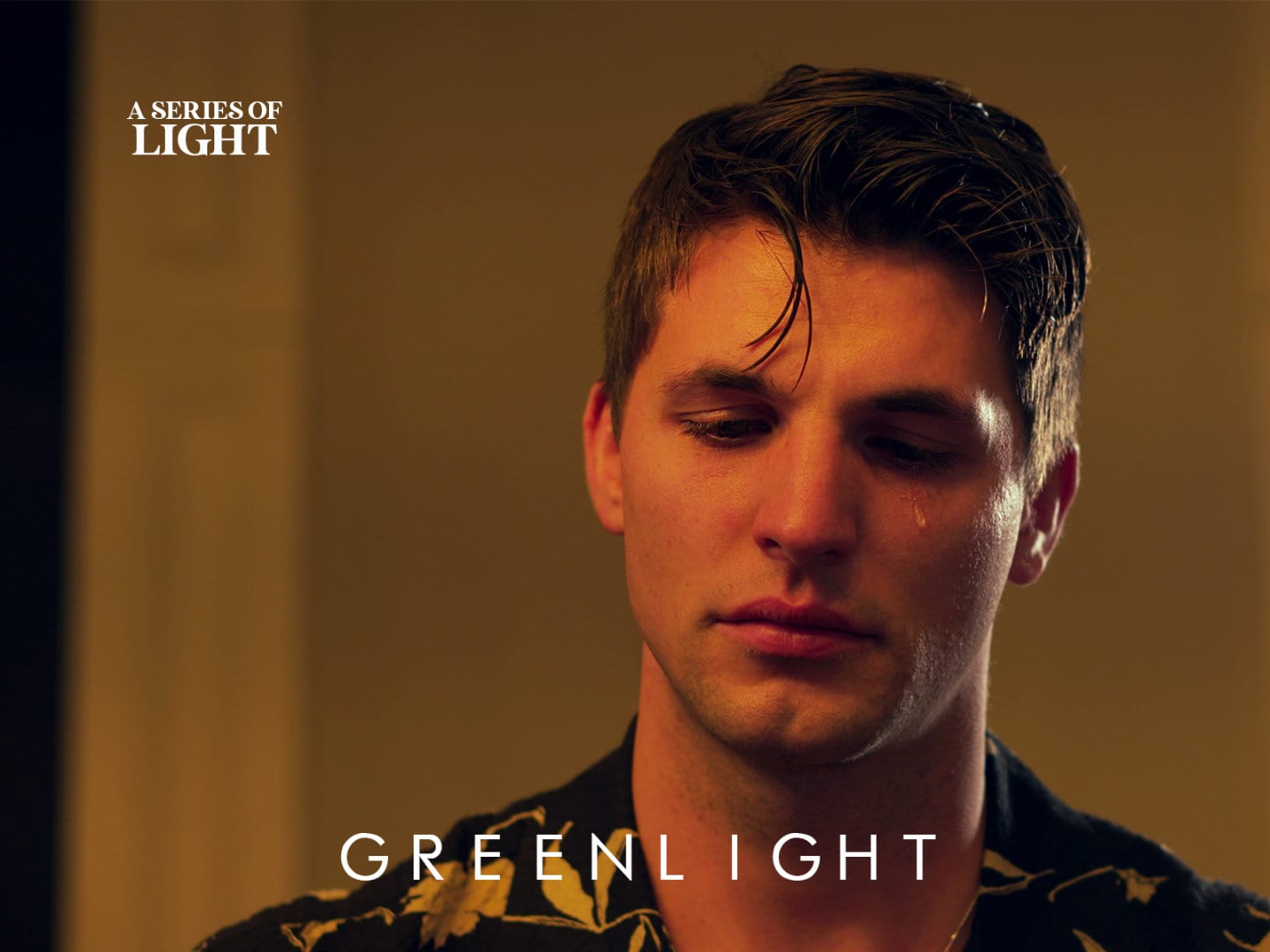
The audience wants to see real humans on-screen to relate to – not actors.
- Some of your roles have been almost sans dialogues. And, yet, you have pulled them off convincingly. How do you immerse yourself into the characters you play?
The most important thing I learnt in Drama class was to make a character human. Because, we relate with being human the most. Many actors fail because they are simply acting the part. In fact, they are overreacting to everything. It’s almost as if it were all a musical.
For instance, if you are to pick up the phone for a chat, you simply won’t pick up and stand there. You would go about it almost involuntarily. You’d go about doing your laces, rushing to get the bus to work, or making marmite on toast whilst your phone remains tightly squeezed between your ear and the shoulder. This is the most natural way anyone of us would go about it in our real lives, isn’t it?
You should have learnt your lines so well, that as you walk around, do your day-to-day chores in the scene, you say your lines effortlessly, naturally. Because humans don’t think when they talk with their common associations. We’ve learnt English so bloody well, that when our parents call us we can do three different things whilst chatting to them, so should an actor emulate the same in his scene. You shouldn’t be thinking about your lines, you should be thinking what the character is thinking in that scene, and that’s normally their next move or a problem they’ve just faced.
So, when I get a script, I really try to just make the character human. What would the character do? How would he talk? What would he do in this situation? Because at the end of the day – I’m playing the part. Actors want to get as far away as possible from themselves but, that isn’t fully feasible.
The audience wants to see real humans on-screen to relate to – not actors.
- That was quite simply profound learning. So, tell me, in that case, what was the challenging part of playing Sam and what came by easily?
The challenging parts of playing Sam were getting to the emotions needed. On-screen it seemed like such a small thing – he received an email? So what? But to find the emotion deep within, that this could potentially end Sam’s career was difficult. It was all internal and I was basically alone seeing as my co-worker was in LA when we were filming. So, I had nobody to bounce off, argue with, cry with. I had to do it all independently. Now, some people might thrive in this; being left to their own devices, but not me. I struggled, honestly.
But, the easiest part of playing Sam was emulating him. Because we are the same age, have the same accent, both actors (Except he’s a child star and I am not), we look the same and apart from him being gay, we are pretty much the same person. I enjoyed stepping into his shoes, frankly.
- Since Greenlight touches upon fame, I’d like to ask: The price of fame is different for different people. For some, it’s just a loss of privacy. What is the most that you have had to pay so far?
I haven’t experienced fame to that degree yet – and I may never know of it either. But, if you are an extremely talented actor it is inevitable then that fame follows you. It’s an inevitable by-product of this profession. So I think it’s best to accept it gracefully if you have chosen this field.
However, what I have experienced is a small circle of fans who follow and enjoy my work and write to me and ask for signatures etc. Which is all lovely, because I really do appreciate people supporting my craft.
But the worst thing that I’ve experienced so far is people not taking no for an answer. Of course, people sometimes don’t even bother seeking permission, let alone approval. But, I had the worst when I got asked by an artist for a sitting of my portrait. But, as it turned out, he only did nudes, which I wasn’t interested in as I’m not a still-life model. So, I politely declined. He, however, went ahead regardless of my protests and drew me and made up for what he couldn’t see. This is a sad thing you have to put up with, wherein even when you say no, people don’t respect it and proceed anyway without caring for its consequences.
That picture is still out there for the world to see and it isn’t even real. People might think I agreed for it when the truth is the opposite.
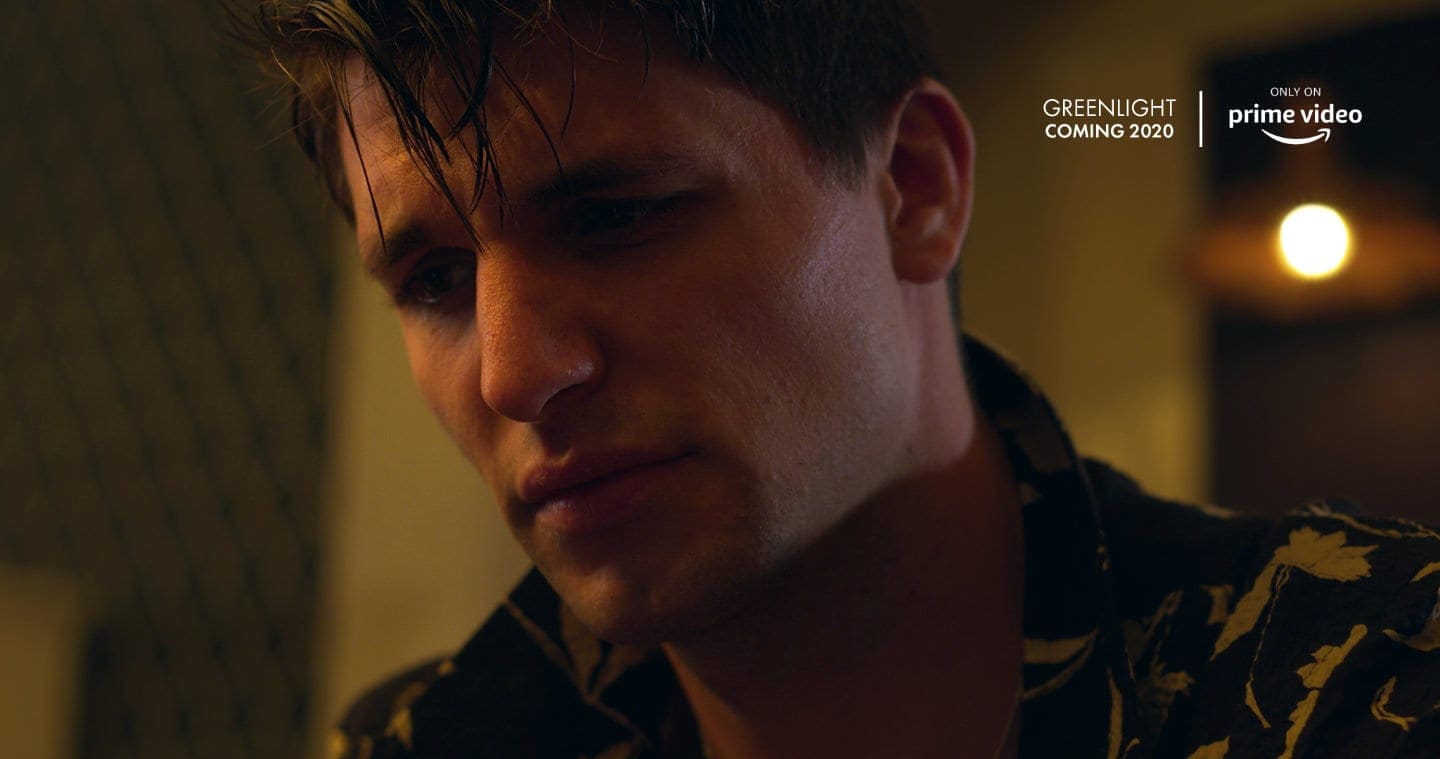
- That truly is sad. But, it interestingly brings me to my final question. For an actor, a star, their image is the ultimate. How willing are you to separate the artist in you from the paraphernalia?
Quite a bit, actually. I’m happy to let people see the real me. I have nothing to hide. In that regard, I am not image-conscious at all, because I am thoroughly comfortable with my being. Also, I have had a great upbringing and my parents imparted in me some very valuable lessons and they sure are here to stay.
BUT – I’d like my work to outshine me. I’d prefer to be known for it. I don’t want my personal life to be in the media. But I’d like my work to be discussed. I’d like my work to be at the forefront of my name.
- This was wonderful. Thank you, for your time, Jack. Oh, what happened with the hacker, by the way?
Oh, hahaha, nothing ever happened with the hacker. I got some professional advice and was told that what they do is get your old password from some weak server you used ages ago in the hope that you are still using the same to scare you with it. Didn’t work with me, clearly.
I’ve absolutely loved this interview too. There have been some great questions. Thanks for the opportunity to talk, Nimisha.
Endearingly honest, thoughtful and intellectually curious, Parr’s portrayal of Sam in Greenlight is a mere peek-a-boo to the talent he holds. Our best wishes to the man whose idea germed the start of an entire series.


